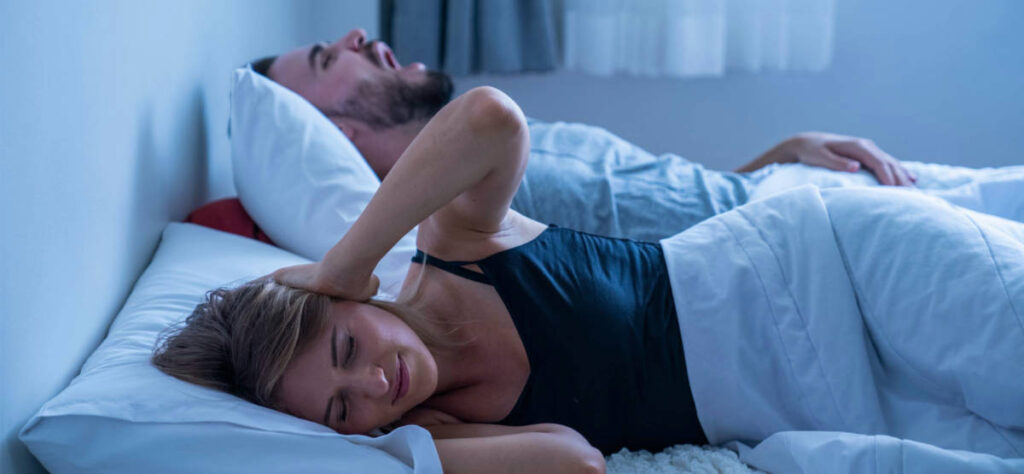7 Signs You May Have Sleep Apnea, Are you feeling exhausted all the time, even after a full night’s sleep? Do you find yourself snoring during the night or waking up with a dry mouth? If so, you may be suffering from sleep apnea. Sleep apnea is a serious medical condition that affects over 18 million Americans and can have a serious effect on your overall health and well-being.

In this blog, we’ll be discussing 7 signs you may have sleep apnea and what you need to know to properly diagnose and treat it. So if you’re looking for information on recognizing the signs of sleep apnea and what to do about it, read on!
Overview of Sleep Apnea
Sleep apnea is a serious disorder that causes people to stop breathing during sleep. It is most commonly seen in individuals over the age of 50, but it can occur in people of all ages. Sleep apnea is caused by a combination of factors such as obesity, high blood pressure, and a narrow airway. Without treatment, sleep apnea can lead to daytime sleepiness, headaches, problems with concentration and memory, and even more serious health complications. While there is no cure for sleep apnea, treatments can help manage and improve symptoms.
Symptoms and Risks of Sleep Apnea
There are many symptoms and risks associated with sleep apnea. The most common are:
Snoring
There are many potential causes of snoring, but sleep apnea is the most common and potentially serious. Sleep apnea is a condition where people stop breathing during sleep, typically due to a blockage in the airway. This can cause sleepiness during the day and lead to other health problems. Snoring is often a sign of sleep apnea, and can be a sign that treatment is needed.
Obstructive sleep apnea
Obstructive sleep apnea is a condition in which the airway becomes blocked during sleep, resulting in intermittent episodes of shallow breathing. It is the most common sleep-related breathing disorder, affecting up to 5 percent of adults. Obstructive sleep apnea is linked with an increased risk of cardiovascular disease, stroke, and diabetes, and can also be a factor in the development of Alzheimer’s disease.
There is currently no cure for obstructive sleep apnea, but treatments include lifestyle changes, medication, and surgery. Lifestyle changes include avoiding alcohol and smoking, maintaining a healthy weight, and getting regular exercise. Medications include oral appliances such as CPAP (continuous positive airway pressure) machines, which help to keep the airway open by forcing air into the lungs, and nasal CPAP, which delivers air through the nose. Surgery may be necessary to correct structural abnormalities of the airway or to remove obstructions from the airway.
Restless leg syndrome
Restless leg syndrome (RLS) is a disorder that affects the nervous system. It is characterized by an uncontrollable urge to move the legs or feet. The disorder can be very frustrating and difficult to live with.
People with RLS often experience an overwhelming urge to move their legs or feet during sleep. This urge can be so strong that it can be difficult to fall asleep or stay asleep. In some cases, people with RLS also experience an intense sensation of itchiness or tingling in their legs.
RLS is most commonly caused by sleep apnea, a disorder in which people stop breathing during sleep. This can cause the brain to send signals to the body to move the legs.
There is currently no cure for RLS, but there are treatments that can help improve the symptoms. These treatments include wearing comfortable shoes and socks that limit movement, using a CPAP machine to help to breathe during sleep, and using medications to treat sleep apnea.
Daytime drowsiness
People with sleep apnea are more likely to experience daytime drowsiness. This is because sleep apnea causes the airway to become blocked frequently during sleep, which leads to low oxygen levels in the blood. When this happens, it is difficult to stay awake.
Memory problems
People with sleep apnea tend to have problems with their memory. This is because sleep apnea causes people to have less sleep, which can lead to problems with focus and concentration. Sleep apnea also causes people to have more interruptions in their sleep, which can lead to problems with memory.
Depression
Depression is a serious mental illness that can be caused by a variety of factors, including sleep apnea. People with sleep apnea are more likely to experience depression, anxiety, and other mental health issues.
Sleep apnea is a condition in which people experience repeated episodes of interrupted sleep. These episodes can be caused by a variety of factors, including obesity, snoring, and sleep deprivation.
People with sleep apnea are more likely to experience problems with their breathing. This can lead to fatigue, mood swings, and depression.
Sleep apnea is a serious health condition that should be treated as soon as possible. If you are experiencing depression, anxiety, or other mental health issues, please talk to your doctor about your options for treatment. Also, check this Vitality CBD!
Obesity
Obesity is a major public health problem in the United States. It is estimated that more than one-third of adults in the United States are obese, and obesity is a leading cause of preventable death. Obesity is also a major health problem in children, with an estimated 36% of children aged 6 to 19 years being obese. Obesity is caused by a combination of genetic and environmental factors.
One of the most important factors that contribute to obesity is sleep apnea. Sleep apnea is a condition in which people stop breathing during sleep, causing them to become overweight or obese. People with sleep apnea are three times more likely to be obese than people without sleep apnea.
People with sleep apnea are also more likely to have high blood pressure, high cholesterol, and diabetes. Sleep apnea is a major cause of sleep-related obesity. People with sleep apnea are more likely to have a larger waist circumference and a higher Body Mass Index (BMI) than people without sleep apnea.
Sleep apnea is a serious health problem that can be treated with sleep apnea treatments. Sleep apnea treatments include sleep therapy, oral appliances, or surgery.
High blood pressure
One of the most common health conditions is high blood pressure. It is estimated that one in three adults has high blood pressure, which is defined as a reading of 140/90 or higher. This is a major health concern, as high blood pressure can lead to heart disease, stroke, and other life-threatening conditions.
There are many factors that can cause high blood pressure, including obesity, genetics, and age. However, one of the most common causes of high blood pressure is sleep apnea. Sleep apnea is a condition in which people stop breathing during sleep, which can lead to high blood pressure.
A study published in the journal Sleep found that people with sleep apnea are twice as likely to have high blood pressure as people without the condition. The study also found that people with high blood pressure who also have sleep apnea are even more likely to have the condition severe enough to require treatment.
If you are diagnosed with sleep apnea, it is important to see a doctor. There are treatments available that can help to lower your blood pressure and improve your overall health.
Heart disease
Heart disease is a leading cause of death in the United States. The American Heart Association (AHA) estimates that about 1 in 3 deaths in the US is attributable to heart disease and that sleep apnea is a leading cause of heart disease in men and women.
Diabetes
People with diabetes are more likely to experience sleep apnea, a disorder in which the person stops breathing during sleep. Sleep apnea is a common cause of diabetes, and it can lead to high blood sugar levels and other health problems. People with diabetes are also more likely to have other health problems, such as heart disease and stroke. There is no cure for sleep apnea, but treatments can help improve the quality of sleep and reduce the risk of diabetes.
Cancer
There is a link between cancer and sleep apnea. A study published in the journal Sleep found that people with sleep apnea are more than twice as likely to develop cancer as those without the disorder.
Premature aging
If you suffer from sleep apnea, you may be prematurely aging. This is because sleep apnea is a common cause of wrinkles and other signs of aging. Sleep apnea is a disorder in which the airways become blocked frequently during sleep. This interrupts the normal breathing process and can lead to fatigue, poor concentration, and even heart problems.
Snoring is the most common symptom of sleep apnea. It is usually a sign that the person is not getting enough oxygen while they are sleeping. Obstructive sleep apnea is when the person’s airway becomes blocked repeatedly during sleep. This can cause them to stop breathing and wake up gasping for air.
7 Signs You May Have Sleep Apnea
Waking Up with a Morning Headache
If you’re experiencing a headache in the morning, it may be a sign that you’re suffering from sleep apnea. Sleep apnea is a common disorder in which people experience repeated episodes of interrupted breathing during sleep. This can cause headaches, fatigue, and other problems. If you’re experiencing a morning headache and have a family history of sleep apnea, it’s important to get checked out. There are treatments available that can help you improve your sleep quality and reduce your headaches.
Excessive Snoring
There are many reasons why people snore. Some people snore because of a medical condition, such as sleep apnea, while others snore because of a lifestyle choice, such as drinking alcohol late at night. Regardless of the reason, excessive snoring can be a sign of sleep apnea.
Sleep apnea is a common sleep disorder in which people stop breathing during sleep. The disorder is caused by a combination of factors, including obesity, a narrow neck, and a high-pitched voice. When these factors combine, they create a dangerous situation in which the airway repeatedly collapses during sleep. This can cause sleep apnea patients to stop breathing multiple times throughout the night.
Gasping and Choking during Sleep
If you are experiencing difficulty breathing during sleep, there is a good chance that you are suffering from sleep apnea. Sleep apnea is a condition where people experience repeated episodes of shallow breathing during sleep. This can lead to fatigue and even weight gain, as apnea can cause people to lose sleep and eat more than usual. If you are experiencing any of the following signs and symptoms, it is important to see a doctor to rule out sleep apnea: choking or gasping during sleep, loud snoring, fatigue during the day, and headaches. If you are diagnosed with sleep apnea, your doctor may recommend a sleep study to determine the extent of the problem and recommend treatment.
Waking Up Tired Despite Getting Enough Sleep
If you’re waking up tired despite getting enough sleep, it may be a sign of sleep apnea. Sleep apnea is a condition where people stop breathing during sleep, most often due to a blockage in their airway. This can cause fatigue and poor concentration the next day. If you’re experiencing these symptoms, it’s important to get tested for sleep apnea. If you’re found to have the condition, treatment can help you get more rest and improve your overall health. You can also read about these simple tips for gaining instant energy when you’re feeling tired!
Poor Concentration During the Day
If you find that you have difficulty concentrating during the day, it may be a sign of sleep apnea. Sleep apnea is a condition in which people stop breathing repeatedly during sleep. This can cause fatigue, headaches, and problems with concentration. If you are experiencing these problems, it may be worth getting evaluated for sleep apnea.
High Blood Pressure
If you have high blood pressure, it’s important to know that it can be a sign of sleep apnea. Sleep apnea is a condition in which people stop breathing during sleep, and high blood pressure is one of the most common symptoms. The combination of sleep apnea and high blood pressure can lead to heart problems, stroke, and even death. If you’re having trouble breathing during sleep, you should see a doctor to check for sleep apnea and/or high blood pressure.
Irregular Heartbeat
If you have an irregular heartbeat, it may be a sign of sleep apnea. This disorder is characterized by pauses in breathing during sleep, which can lead to heart problems. If you experience an irregular heartbeat while you’re sleeping, talk to your doctor about your symptoms.
Diagnosis and Treatment
Diagnostic Tests for Sleep Apnea
There are a variety of diagnostic tests that can be used to determine if someone has sleep apnea. These tests include polysomnography, a sleep study, and a sleep questionnaire. Polysomnography is a procedure that records the various stages of sleep. A sleep study is a more detailed procedure that records the amount and quality of sleep. A sleep questionnaire is a tool that can help to determine if someone has sleep apnea.
Treatments for Sleep Apnea
There are a variety of treatments that can be used to treat sleep apnea. Some treatments, such as using a CPAP machine, are effective for many people. Other treatments, such as using a mouthguard, may be more effective for some people. Some people may need to use more than one treatment to be successful.
Conclusion
Having a good night’s sleep is essential for optimal health and well-being. Unfortunately, many people suffer from sleep apnea without even knowing it. If you recognize any of the signs and symptoms of sleep apnea, it is important to speak to your doctor and get a proper diagnosis.
With the help of lifestyle changes and medical treatments, you can enjoy a good night’s sleep and get back on track with your health. If you find these blogs helpful, please share this with your loved ones and friends. You are also welcome to visit our other related blog for more tips and recommendations.


